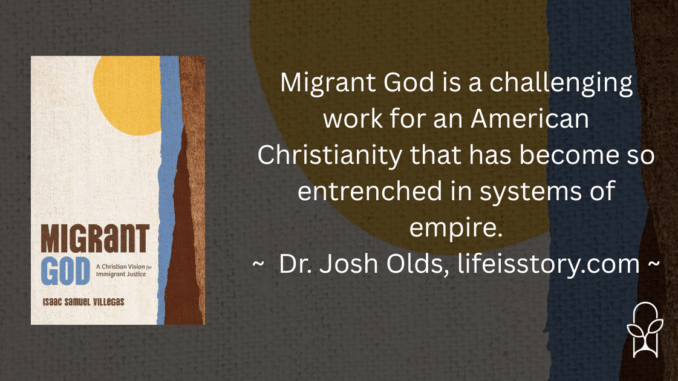
Goodreads
Donald Trump won the 2024 presidential election for a number of reasons, but primary among them was his ability to demonize and vilify immigrants while promising mass deportations. He was successfully able to point to an “other” and compellingly argue that they were harming “us.” Were the arguments factual? No. Were they a pretense for racism of white nationalism? Yes. But the picture that Trump painted was undeniably evocative and effective. In Migrant God: A Christian Vision for Immigrant Justice, Isaac Samuel Villegas invites readers into a much different and more truth-filled picture.
Drawing from his experiences as a Mennonite pastor and the son of immigrants, Villegas presents a series of narratives that intertwine personal stories with theological reflection. Through accounts of vigils in the Arizona desert, shared meals in Tijuana shelters, and sanctuary offered to those facing deportation, he portrays a God who journeys with the marginalized, embodying solidarity and hope.
One of the book’s notable strengths lies in its grounding of theological concepts in lived experiences. Villegas doesn’t merely discuss doctrines; he illustrates them through real-life encounters, making abstract ideas tangible. Migrant God’s portrayal of God as a migrant is deeply resonant and challenges readers to reconsider traditional perceptions and recognize the divine in the faces of those seeking refuge. Moreover, his emphasis on community—both in terms of shared struggles and collective action—highlights the transformative power of solidarity.
In today’s global context, where debates around immigration often become polarized, Migrant God offers a timely and compassionate perspective centered on justice. Villegas avoids culture war rhetoric. Rather, he emphasizes the human stories behind the headlines, urging readers to see migrants not as statistics but as individuals bearing the image of God. Immigrants—legal or otherwise—are humans made in God’s image. This approach fosters empathy and challenges communities, especially faith-based ones, to reflect on their role in advocating for justice and offering sanctuary.
Migrant God is a compelling call to action, urging readers to embody their faith through acts of compassion and justice. Villegas masterfully bridges the gap between theology and practice, reminding us that to follow a migrant God is to walk alongside the displaced, offering hope and hospitality. It’s a challenging work for an American Christianity that has become so entrenched in systems of empire. For those seeking a deeper understanding of the intersection between faith and immigrant justice, Migrant God reveals a pathway forward.
